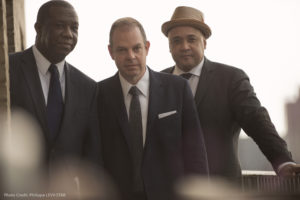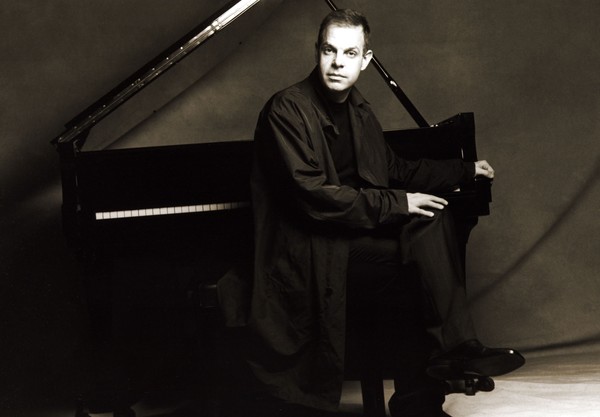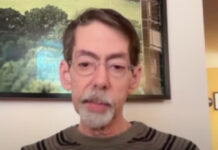In 2004, jazz pianist Bill Charlap and his Trio recorded an album called Somewhere – The Songs of Leonard Bernstein. Now in the year of the 100th anniversary of Leonard Bernstein’s birth, the trio is re-exploring the composer’s work. They will be performing this Thursday night at the Broad Stage in Santa Monica. Joining them will be recent Grammy Award-winning jazz vocalist Cécile McLorin Salvant. (The trio will also be performing two shows, without Salvant, at the Samueli Theatre at the Segerstrom Center for the Performing Arts on April 28th.)

I recently spoke with Charlap about Bernstein, his collaboration with Salvant and his family’s Peter Pan overlap with Bernstein.
How have your arrangements of Bernstein’s work from 14 years ago held up in your opinion?
They have grown a great deal. Just like the trio or a family or relationship will grow. We are always playing the music every night in a new way. We try to approach it like it’s the first time we’ve ever played it. The ability to really have a conversation all the time and reassess what we are doing, to renegotiate a line or rhythmic phrase, before you get to the end of it, is one of the great joys of jazz. As Sondheim says, “God is in the details.” It’s all in the details. I think it’s grown a great deal.
What appeals to you most about Bernstein and his work?
I love Leonard Bernstein the theatre composer because it is all about the melodies and melody-driven music. And I love his perspective on popular theatre and music writing. He came from the other side of the track. He was writing classical music before he wrote a popular song. As opposed to George Gershwin who went the other way. There’s a big connection between Gershwin and Bernstein. And Bernstein amalgamates a lot of the things he really loves in his music. You hear Aaron Copland and Stravinsky and Gershwin. You certainly hear all those things in Bernstein’s music.
Are there Bernstein songs or compositions that you didn’t record for that album that are now part of your repertoire?
I have certainly done other Bernstein concerts where we added more of the dance music from the gym (from West Side Story), like the “Mambo” and songs like “I Feel Pretty” which Cécile sings so beautifully. There are lots of others like “New York, New York” and “Wrong Note Rag.” I’m not certain I’m going to play them out there. I haven’t 100% decided on all of it yet. We’re going to make it a collaboration, so it will be the two of us, Cécile and I, making the decisions about how to approach the songs.
What makes Cécile McLorin Salvant not just a great singer, but a great collaborator for you?
She is a supreme musician. She is as great as any maestro on the scene. We don’t feel like we are playing and accompanying a singer, we’re with another musician. She has the taste and knowledge and the history of music and her own imprint and the ability to listen and react. She is surefire, but absolutely willing to take chances. And warmth and personality and she gives herself to the music. She’s just got all those things. The essence of the sound of jazz is all throughout her music.
Your father, Mark “Moose” Charlap, wrote the music for the best-known musical version of Peter Pan. Leonard Bernstein also wrote a musical version of Peter Pan that pre-dates your father’s by four years. Why do you think your father’s show became the one that audiences embraced?
Well, my father was really a songwriter with a capital “S” and a theatre writer. If you think about a song like “I Won’t Grow Up,” that’s pop music with a capital “P.” Everyone can remember and sing it. It’s music for everybody and it is childlike. He was 26 years old and he loved children. He wanted to connect in that sort of way. Bernstein’s Peter Pan, which is wonderful, is a bit more Brechtian. You listen to Boris Karloff being Captain Hook and it’s so different than Cyril Ritchard being Hook. Moose’s music and Carolyn Leigh, Betty Comden and Adolph Green’s lyrics have a childlike quality that is so tuneful and natural.
Bernstein once said that “The 20th century has been a badly written drama, from the beginning.” If that’s so, how did so much great music come from Bernstein himself as a response? And what would you say the 21st century has been so far?
That’s an awfully big question. Ultimately it is about being yourself. An artist being themselves, if they have something to say that is original, is going to contribute something original and I love beautiful things. Sometimes out of some of the greatest pain and challenge comes some of the most beauty – thus jazz in the first place. This is music that comes from the African-American experience in America. It belongs to everybody, but that’s its genesis. It’s one of the great struggles and we’re still grappling with that kind of lack of true understanding of each other’s worth. I mean that for every “ism” and every individual sect that we have and everybody who deserves the honor of being a human being. And being a human being is to have creative potential. I don’t care what you are or who you are, you have creative potential and the ability to reach God’s universe.
Photo Credit: Carol Friedman














